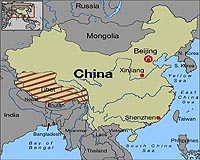 |
Beijing (AFP) March 24, 2010 China indicated Sunday it would take a hard line on the selection of a successor to the ageing Tibetan spiritual leader the Dalai Lama in rare comments on the sensitive issue. The final decision on the reincarnated successors to the Buddhist region's top lamas lies with Beijing, insisted Qiangba Puncog, Tibet's former governor and a delegate to the national parliament. "It must get the approval of the central government otherwise the reincarnation will be illegitimate and invalid," he told reporters on the sidelines of China's National People's Congress session. Traditionally, the search for the figure's reincarnated successor was conducted by the region's high lamas. But China's officially atheist Communist Party-ruled government has claimed the right to intervene, citing a precedent set by a past emperor. The issue of who will succeed the monk looms as potentially explosive after an outburst of anti-Chinese violence tore through the region in March 2008, prompting a tight security clampdown, which continues. China vilifies the exiled monk as a separatist. He denies this and remains hugely popular in his Himalayan homeland. Many Tibet experts believe China is waiting for him to die and then install its own Tibetan spiritual leader. Amid such worries, the 1989 Nobel Peace Prize winner said last month he would have no misgivings ending the centuries-old spiritual tradition if Tibetans so choose. "(Its) ultimately up to people, I made clear, whether this very institution should continue or not," the 14th Dalai Lama told National Public Radio on a visit to Los Angeles. "If majority of Tibetan people feel the Dalai institution is no longer much relevant, then this institution should cease -- there is no problem. "It looks like the Chinese are more concerned about this institution than me," he said with a laugh. The Dalai Lama, who fled his Chinese-ruled homeland in 1959, turns 75 in July and is believed to be in good health. He has said his successor could be appointed before his death or democratically elected. The Dalai Lama could also, he has said, be reincarnated in exile -- out of Beijing's reach. "Right now there is no need to excessively discuss this issue of reincarnation," Tibet's regional chairman Padma Choling told journalists. "At this moment the Dalai is still alive, let's wait until he is dead and then we can talk about it." Controversy emerged over the reincarnation issue in 1995 when China selected Gyaincain Norbu as the 11th Panchen Lama, Tibet's second-highest ranking figure. In doing so, the Communist Party rejected a boy selected by the Dalai Lama. The child, Gedhun Choekyi Nyima, has disappeared from public view and is believed to have been put under a form of house arrest. Asked at the same press conference about the boy's whereabouts and why he disappeared, Padma Choling said he was being kept out of public view at his own request. "As far as I know he and his family are now living a good life in Tibet," he said. "He and his family are reluctant to be disturbed and want to live an ordinary life," he added. China has been raising the profile of its 20-year-old choice as Panchen Lama in an apparent attempt to legitimise him. Gyaincain Norbu was recently appointed vice president of China's national Buddhist association and as a delegate to a body that advises the main parliament, which is the midst of its March 5-14 session. He has been quoted by state media praising Chinese control of Tibet.
Share This Article With Planet Earth
Related Links China News from SinoDaily.com
 China issues new warnings on Tibet, Taiwan
China issues new warnings on Tibet, TaiwanBeijing (AFP) March 4, 2010 China on Thursday launched a new warning to foreign countries not to interfere in its affairs in Tibet and Taiwan - two issues that have badly strained ties with the United States. Washington irked Beijing in January when it approved the sale of a 6.4-billion-dollar package of arms to Taiwan, and then again a month later when US President Barack Obama met the Dalai Lama at the White House. ... read more |
|
| The content herein, unless otherwise known to be public domain, are Copyright 1995-2010 - SpaceDaily. AFP and UPI Wire Stories are copyright Agence France-Presse and United Press International. ESA Portal Reports are copyright European Space Agency. All NASA sourced material is public domain. Additional copyrights may apply in whole or part to other bona fide parties. Advertising does not imply endorsement,agreement or approval of any opinions, statements or information provided by SpaceDaily on any Web page published or hosted by SpaceDaily. Privacy Statement |